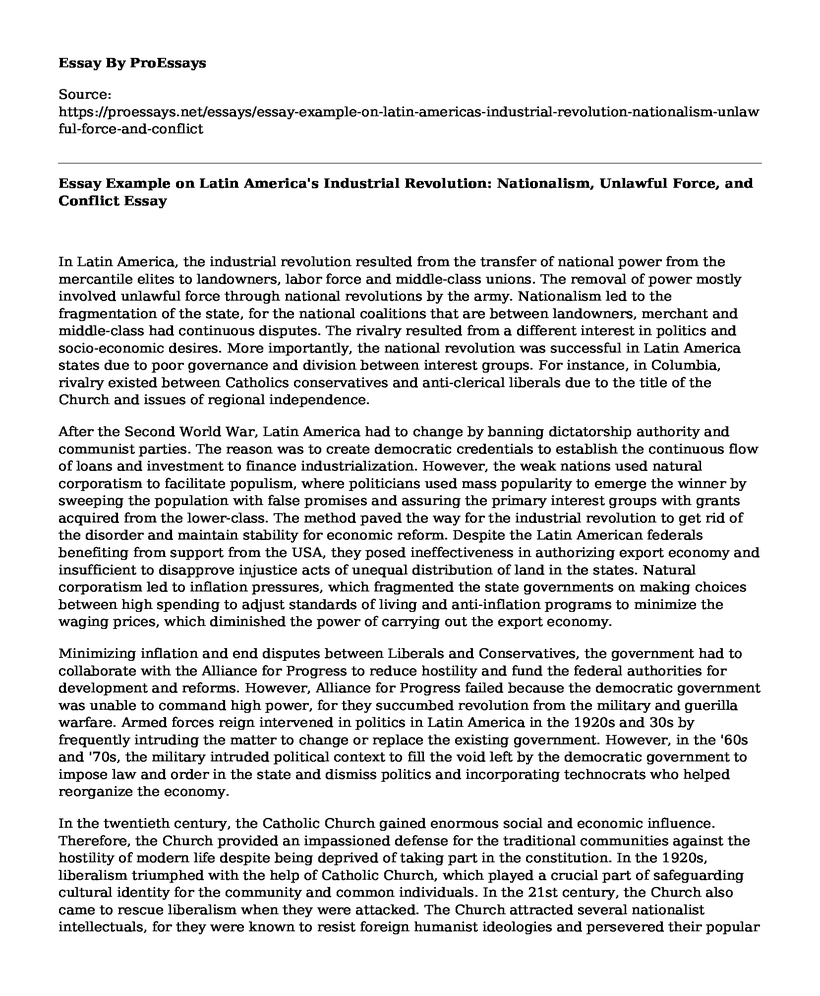In Latin America, the industrial revolution resulted from the transfer of national power from the mercantile elites to landowners, labor force and middle-class unions. The removal of power mostly involved unlawful force through national revolutions by the army. Nationalism led to the fragmentation of the state, for the national coalitions that are between landowners, merchant and middle-class had continuous disputes. The rivalry resulted from a different interest in politics and socio-economic desires. More importantly, the national revolution was successful in Latin America states due to poor governance and division between interest groups. For instance, in Columbia, rivalry existed between Catholics conservatives and anti-clerical liberals due to the title of the Church and issues of regional independence.
After the Second World War, Latin America had to change by banning dictatorship authority and communist parties. The reason was to create democratic credentials to establish the continuous flow of loans and investment to finance industrialization. However, the weak nations used natural corporatism to facilitate populism, where politicians used mass popularity to emerge the winner by sweeping the population with false promises and assuring the primary interest groups with grants acquired from the lower-class. The method paved the way for the industrial revolution to get rid of the disorder and maintain stability for economic reform. Despite the Latin American federals benefiting from support from the USA, they posed ineffectiveness in authorizing export economy and insufficient to disapprove injustice acts of unequal distribution of land in the states. Natural corporatism led to inflation pressures, which fragmented the state governments on making choices between high spending to adjust standards of living and anti-inflation programs to minimize the waging prices, which diminished the power of carrying out the export economy.
Minimizing inflation and end disputes between Liberals and Conservatives, the government had to collaborate with the Alliance for Progress to reduce hostility and fund the federal authorities for development and reforms. However, Alliance for Progress failed because the democratic government was unable to command high power, for they succumbed revolution from the military and guerilla warfare. Armed forces reign intervened in politics in Latin America in the 1920s and 30s by frequently intruding the matter to change or replace the existing government. However, in the '60s and '70s, the military intruded political context to fill the void left by the democratic government to impose law and order in the state and dismiss politics and incorporating technocrats who helped reorganize the economy.
In the twentieth century, the Catholic Church gained enormous social and economic influence. Therefore, the Church provided an impassioned defense for the traditional communities against the hostility of modern life despite being deprived of taking part in the constitution. In the 1920s, liberalism triumphed with the help of Catholic Church, which played a crucial part of safeguarding cultural identity for the community and common individuals. In the 21st century, the Church also came to rescue liberalism when they were attacked. The Church attracted several nationalist intellectuals, for they were known to resist foreign humanist ideologies and persevered their popular culture. Due to their deep-rooted cultural conservative, they were bound to reject modern life. However, the Church faced resistance from two directions. The liberal capitalism was the first group to disrupt the Church's progress by undermining hierarchy and paternalist ethics which the Catholicism had preserved in modern life. Another group that was against the Church progress was secular nationalism, which challenged religious control by progressively advancing in the urban areas where the Church was losing its grip with the mass of people.
Cite this page
Essay Example on Latin America's Industrial Revolution: Nationalism, Unlawful Force, and Conflict. (2023, Mar 02). Retrieved from https://proessays.net/essays/essay-example-on-latin-americas-industrial-revolution-nationalism-unlawful-force-and-conflict
If you are the original author of this essay and no longer wish to have it published on the ProEssays website, please click below to request its removal:
- The Seven Years' War Paper Example
- Essay Sample on Origins of the Constitution
- Essay Example on Modern Policing: Adapting to New Technology & Community Objectives
- Research Paper on The US Presidency: History and Controversy Since 1776
- Essay Sample on Adolf Hitler: Rise of a German Leader & Tragic End
- Essay Sample on Civil War Ends With Robert E. Lee's Last Attempt at Gettysburg
- Paper Example on Erving Goffman: A Canadian-Ukrainian Jew and His Rise to Fame







